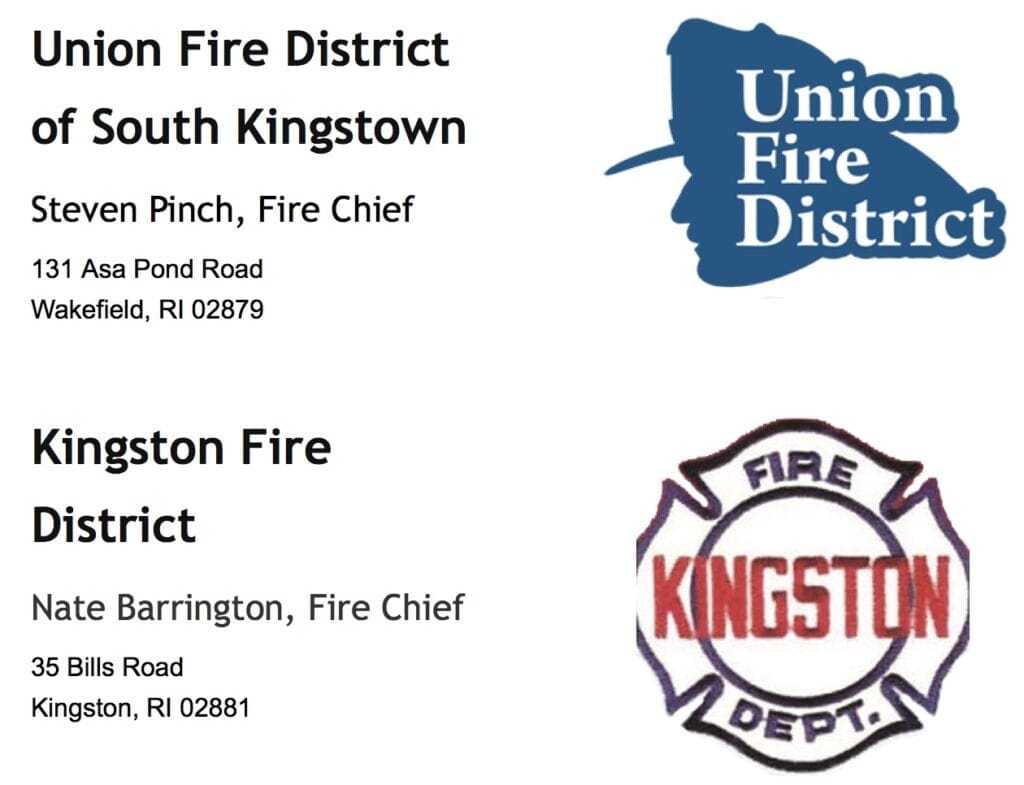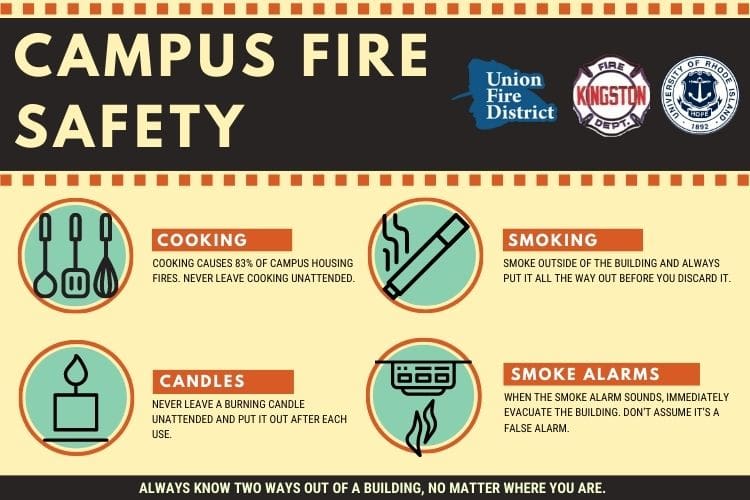Search Posts
Recent Posts
- Out and About in RI: Former Pawtucket Mayor Henry Kinch Tribute in Photos June 24, 2025
- Rhode Island Weather Forecast for January 24, 2025 – Jack Donnelly June 24, 2025
- ART! Mark Freedman, first featured artist of Summer Art Shows at Charlestown Gallery June 24, 2025
- The Bellevue Hotel: Procaccianti Co. New Luxury Boutique Hotel Set for Newport’s Iconic Bellevue Ave June 24, 2025
- Mike Stenhouse, CEO of RI Center for Freedom & Prosperity, named into College Baseball Hall of Fame June 24, 2025
Categories
Subscribe!
Thanks for subscribing! Please check your email for further instructions.

URI Campus Fire Safety Tips: Dorms, Houses.
Union Fire District of South Kingstown Offers Fire Safety Tips as University of Rhode Island Students Resume Classes
As University of Rhode Island students return to campus and off-campus housing, Chief Steven Pinch of the Union Fire District, Chief Nate Barrington of the Kingston Fire District, and URI Assistant Director of Public Safety Samuel Adams would like to remind students to take several steps to avoid fire dangers in their residence halls, homes and apartments.
According to the U.S. Fire Administration, close to 4,000 fires occur each year in university housing across the nation, with most of them caused by cooking. The other leading causes of campus housing fires are arson, careless smoking, unattended candles, overloaded extension cords, power strips and outlets.
Alarms and sprinklers are the most effective fire prevention tools. Fire alarms keep residents safe by warning them of a potential fire. Sprinkler systems help control the fire immediately, often extinguishing the fire or greatly limiting a fire’s ability to spread. According to the fire administration, the combination of working smoke alarms and fire sprinklers reduces the likelihood of dying in a fire by more than 82%.
Students should not rent space in attics, garages and near heating units, where exits, lighting and ventilation likely do not meet fire and building codes. Generally, there should be no more than four renters in an average-sized house.
“We encourage students living on campus and in off-campus housing to review these important safety tips,” Chief Pinch said. “Even in these unprecedented times during the ongoing COVID-19 pandemic, we all must remember to stay prepared in case of a fire and to use safe practices in regard to activities such as cooking, using candles and more.”
“Like our shared responsibilities in the fight against COVID-19, we all need to take steps to prevent fires and the often resulting loss of life and property damage,” Chief Barrington said. “The goal of our collaboration with Chief Pinch and Assistant Director Adams is to keep University students and the wider community as safe as possible during these challenging times.”
To prevent accidents and injuries, the two South Kingstown fire districts recommend the following safety tips from the USFA:
| Escape Plans: |
- Always have two ways to exit, no matter where you are. Plan and practice your escape routes.
- Keep escape routes clear.
- Determine an outside meeting place with roommates or neighbors.
- Get low to the ground and go under the smoke to get to a safe exit. Keep your mouth covered.
- Feel the door before opening it. If it is hot, use your second way out.
- Use the stairs. Never use an elevator during a fire.
- Leave immediately, closing doors behind you, and knock on roommates’ and neighbors’ doors as you exit.
- Once you’re out, stay out! Never go back inside a building until it is cleared and determined safe.
| Fire sprinklers and smoke alarms |
- Never disable or remove batteries from smoke alarms.
- Don’t hang things on or cover fire sprinklers. This can affect their ability to work properly.
- When the smoke alarm sounds, evacuate immediately. Don’t assume it’s a false alarm.
- When looking at a prospective building for housing, ensure it has working smoke alarms and sprinkler systems. Carbon monoxide detectors are also important, and be aware that many older rental properties may still have only battery-powered smoke detectors.
| Cooking is the cause of more than 80% of campus housing fires. |
- Never leave cooking appliances–stoves, ovens, microwaves–unattended.
- Cook only where it is permitted.
- Stand by your pan — if you leave the kitchen, turn the burner or heating element off.
- If a fire starts in a microwave, keep the door closed and unplug the unit.
- Frying poses the greatest risk. Never put water on a grease fire — put a lid on it.
| Smoking |
- Smoke outside of the building and always put the cigarette, cigar or e-device all the way out before discarding it. Remember, smoking and vaping are illegal in all URI buildings and facilities.
- Soak smoking materials in water before throwing them away.
- Use deep, wide and sturdy ashtrays. Place ashtrays on something sturdy and difficult to ignite.
- Large parties violate federal and state regulations put in place during the pandemic. But if you have a small number of people visiting, when the gathering is over, make sure you check under cushions for smoking materials —furniture burns fast.
- It is risky to smoke when you have been drinking or are drowsy.
| Candles are prohibited in all University of Rhode Island buildings and facilities. It is a violation of the Rhode Island Fire Code to have candles in URI buildings. Nevertheless, candles are one of the leading causes of fires in on- and off-campus housing. Nationally, approximately 20% of fires in dorm rooms are started by candles. If you have candles in your off-campus housing: |
- Make sure candles are in sturdy holders and put out after each use.
- Never leave a burning candle unattended.
- Use a flashlight — not a candle — for emergency lighting.
- Keep candles at least 12 inches away from anything that can burn.
- It is better to use flameless candles, which are both safe and decorative.
| The Union Fire District and Kingston Fire District also remind students that alcohol/drugs and fires do not mix. These substances increase your chance of falling asleep while cooking or while a candle is burning and limit your ability to respond to an alarm. |

| As a reminder, the Union Fire District and Kingston Fire Districts rely on dedicated volunteers to keep their communities safe. If you are interested in volunteering, visit skunionfireri.org or kingstonfire.net for more information. |

